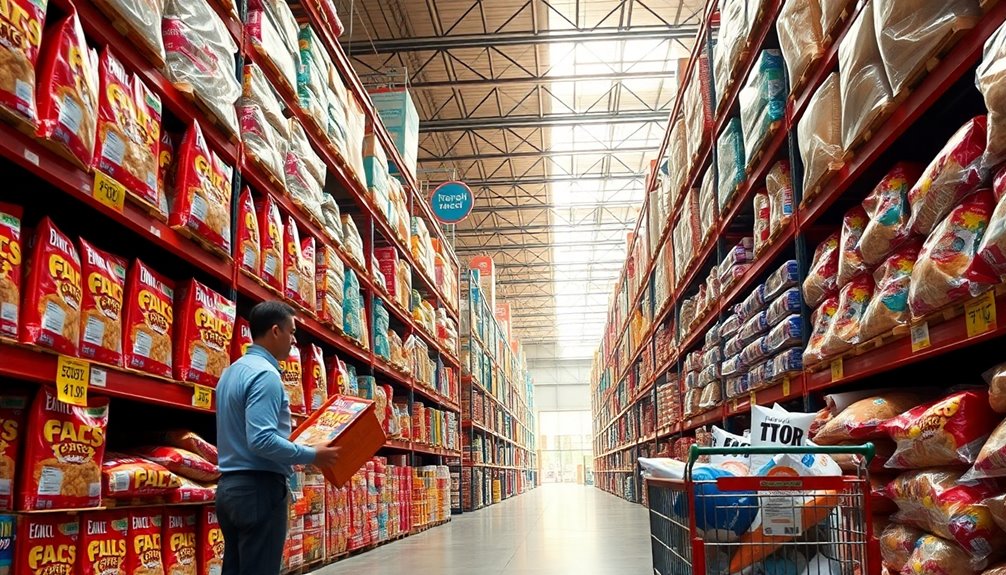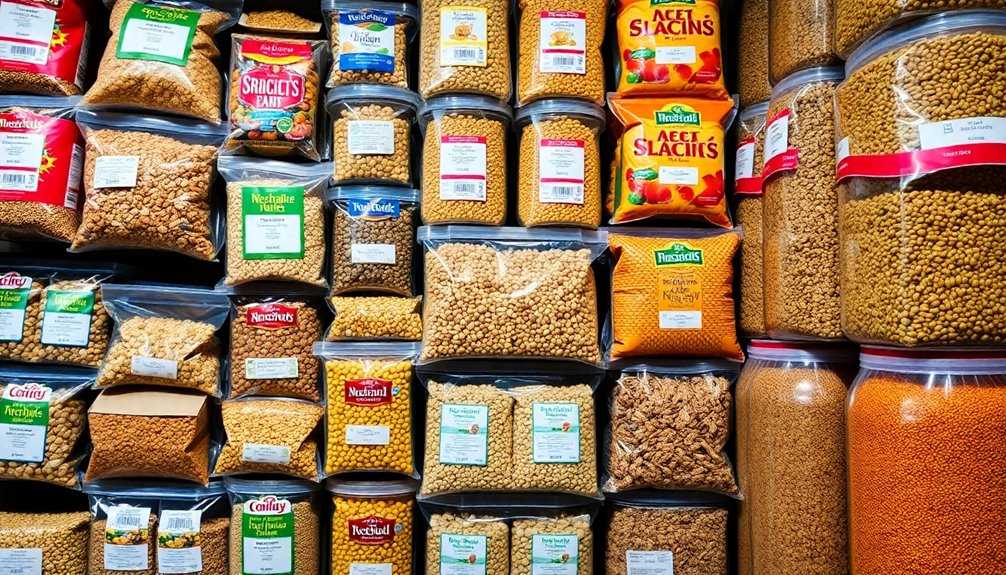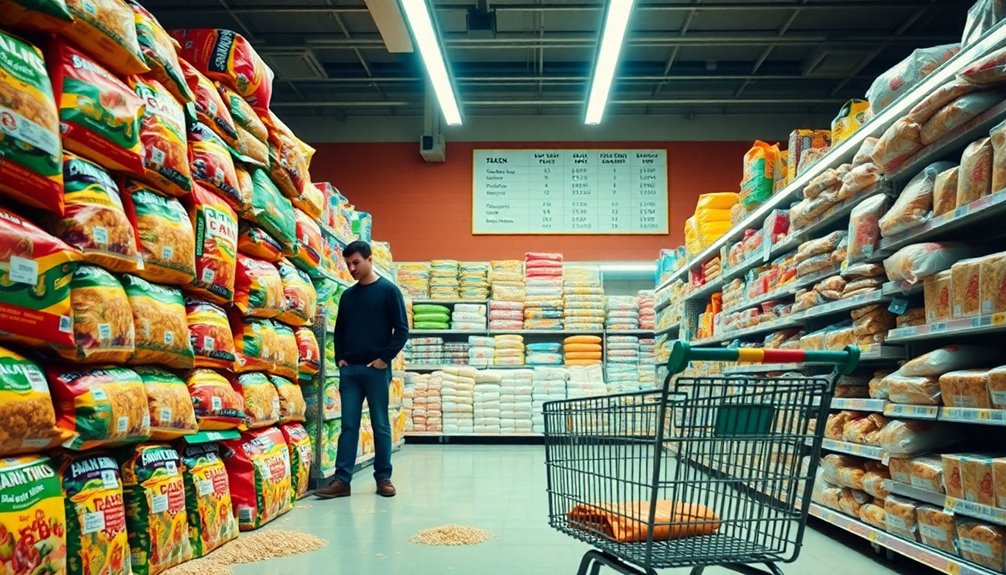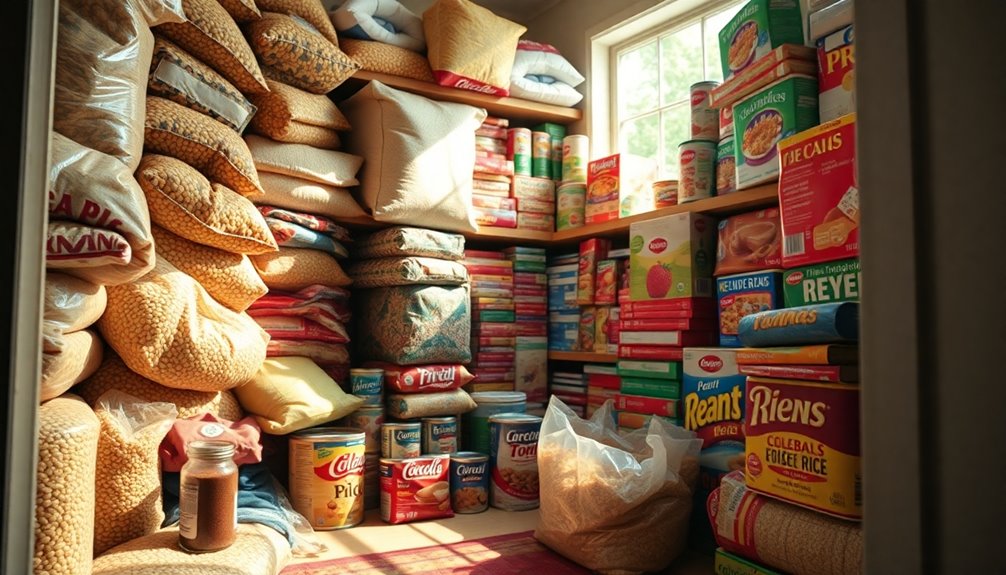Bulk buying can save you money when you strategically choose non-perishable items and plan your purchases. It helps reduce unit costs and minimizes trips to the store. However, it can backfire if you overestimate usage, particularly with perishable goods that may spoil. Always assess your storage space and monitor expiration dates. Impulse purchases can lead to waste, so stick to a list and consider your household's consumption patterns. By employing careful strategies and understanding the types of items that benefit from bulk buying, you can make informed decisions that maximize savings and minimize waste. There's more to explore on this topic.
Key Takeaways
- Bulk buying saves money when purchasing non-perishable items due to lower unit prices and long-term financial planning benefits.
- It can lead to waste and extra costs when buying perishable goods without assessing consumption habits and proper storage.
- Strategic planning and creating shopping lists help avoid impulse buying, ensuring that bulk purchases align with actual household needs.
- Monitoring expiration dates and rotating stock is essential to prevent financial losses from unused items and expired products.
- Comparing prices across retailers and understanding unit costs are crucial for determining true savings in bulk purchases.
Understanding Bulk Buying

When you immerse yourself in bulk buying, you're often looking to save money and stock up on essentials. However, understanding the nuances of bulk buying can help you make informed decisions that align with your budgeting goals. To start, you need to establish clear budgeting tips that fit your lifestyle.
It's crucial to assess your monthly expenses and determine which items you genuinely use frequently. This way, you won't end up with surplus goods that go to waste.
Next, quantity control plays a pivotal role in maximizing the benefits of bulk buying. You must evaluate the shelf life of products and consider how much storage space you have. For instance, buying a large quantity of perishable items might save you money, but if you can't consume them before they spoil, your savings diminish.
To further refine your approach, create a list of items you use regularly and monitor sales or discounts on those products. This strategy not only helps you stay organized but also keeps you within your budget. Remember that bulk buying isn't just about purchasing large quantities; it's about making smart choices that contribute to your overall financial wellness. Additionally, using tools like mini bands for effective workouts can help you maintain a healthy lifestyle while being mindful of your spending.
Benefits of Bulk Buying

Bulk buying offers a range of financial advantages that can greatly impact your budget. When you purchase items in larger quantities, you often benefit from lower unit prices, which can lead to substantial savings over time. This is where the budgeting benefits come into play; by reducing your overall spending on frequently used products, you can allocate those savings to other important areas of your life.
Moreover, bulk buying encourages you to plan your purchases more strategically. By thinking ahead about what you truly need and how much you'll use, you can avoid the pitfalls of impulse buying. This thoughtful approach not only helps you stick to your budget but also fosters a sense of community as you share tips and strategies with others who are looking to maximize their savings.
Another key aspect of bulk buying is the potential for long-term savings. When you invest in non-perishable items, you're less likely to run out and need to buy at higher prices later. This can be particularly beneficial during times of inflation or when supply shortages occur, allowing you to maintain consistent prices for your essential goods. Additionally, many successful budgeting strategies can incorporate custom keto diet plans to ensure that your nutritional needs are met while saving money.
Lastly, buying in bulk can reduce trips to the store, saving you time and transportation costs. This efficiency contributes to your overall financial wellness and allows you to focus on what truly matters, whether that's spending time with loved ones or pursuing your hobbies. Embracing bulk buying isn't just a savvy financial decision; it's a practical way to enhance your lifestyle and foster a sense of belonging within a community focused on smart spending.
Situations That Favor Bulk Purchases

Certain scenarios make bulk purchases particularly advantageous, allowing you to maximize savings and convenience. When it comes to financial planning, buying in bulk can be a game changer, especially for non-perishable items. If you consistently use products like rice, pasta, or canned goods, purchasing them in larger quantities often results in significant long-term savings. You're not just saving money on each item; you're also reducing the frequency of your shopping trips, which can lead to additional savings in gas and time.
Moreover, if you live in a household with multiple family members, bulk buying can be even more beneficial. Items like toiletries, cleaning supplies, and snacks can be consumed quickly, making bulk purchases a practical choice. This approach guarantees you always have essentials on hand, preventing last-minute trips to the store that can disrupt your routine and lead to impulse buying.
Seasonal items also present a prime opportunity for bulk buying. Whether it's holiday decorations or BBQ supplies, buying in advance and in larger quantities can save you money and hassle. Plus, if you plan your purchases around sales or discounts, you'll enhance your long-term savings even further. Additionally, purchasing plant-based foods in bulk can help you maintain a healthy diet while maximizing your budget.
Ultimately, understanding these scenarios allows you to make informed decisions about when to buy in bulk, ensuring your financial planning aligns with your goals while fostering a sense of community and belonging within your household.
Common Pitfalls of Bulk Buying

While bulk buying can yield significant savings, being cautious of the common pitfalls that can undermine those benefits is vital. Many shoppers jump into bulk purchases with enthusiasm, only to encounter unexpected challenges that can result in wasted money and resources. Here are four pitfalls to be aware of:
- Impulse Purchases: It's easy to get carried away in the moment. You might find yourself adding items you don't really need to your cart simply because they're on sale. Always stick to your shopping list to avoid overspending.
- Expiration Dates: When buying in bulk, keep an eye on expiration dates. Purchasing large quantities of perishable items can lead to waste if you're unable to consume them before they expire. Prioritize items with longer shelf lives or those that you regularly use.
- Storage Issues: Consider your available space before making bulk purchases. If you can't store items properly, they may spoil or become damaged, negating any savings.
- Overestimating Usage: It's easy to assume you'll use a bulk item frequently, but behaviors can change. If you find yourself with excess supplies that go unused, the initial savings might turn into a financial loss. Additionally, just like the importance of monitoring liver health, you should regularly assess your pantry to avoid stockpiling items that may not be utilized.
Perishable Goods Considerations

When considering bulk buying, perishable goods demand special attention due to their limited shelf life. While the allure of saving money can be strong, you must be cautious about how much you're purchasing, especially with items like fruits, vegetables, dairy, and meat. These products come with expiration dates that can sneak up on you, leading to more food waste than you might anticipate.
Think about your consumption habits before diving into bulk purchases. Will you realistically consume that huge bag of spinach before it wilts? If not, you'll be tossing out money along with the spoiled produce. It's crucial to assess your household's needs and preferences to avoid overbuying.
Additionally, consider meal planning. By aligning your bulk purchases with your weekly menu, you can maximize the use of perishable items and reduce your chances of wasting food. For example, if you purchase a large quantity of chicken, plan a few different meals that incorporate it throughout the week.
Another key factor is storage. It's vital that you have the right conditions to keep your perishables fresh longer, which directly impacts your ability to utilize them before they expire. Moreover, incorporating functional training into your routine can enhance your energy levels, making you more likely to use those perishables before they spoil.
Storage Space and Limitations

Evaluating your storage space before bulk buying is essential to avoid potential pitfalls. Without adequate space organization, you risk wasting money on items that might spoil or become unusable before you can consume them. Here are four important factors to take into account:
- Available Space: Measure your pantry, fridge, and freezer. Knowing how much room you have helps determine which bulk items you can realistically store.
- Expiration Dates: Be mindful of how quickly perishable goods will expire. Buy items that you can use within their shelf life to prevent waste.
- Storage Solutions: Invest in clear bins, shelves, or containers that can help you maximize your space. Proper organization allows you to see what you have, which reduces the chance of buying duplicates.
- Frequency of Use: Think about how often you use specific items. If you buy in bulk but only occasionally use them, it mightn't be worth the investment. Additionally, consider incorporating meal plans that help you utilize bulk items efficiently to avoid waste.
Comparing Prices Effectively

After ensuring you have the right storage solutions for bulk items, the next step is to compare prices effectively. This process is pivotal for maximizing your cost efficiency when buying in bulk.
Start by gathering prices from various retailers—both online and in-store. Use price comparison websites or apps to streamline this task, allowing you to see the best deals at a glance.
When comparing prices, look beyond just the sticker price. Check the unit price, which shows how much you're paying per ounce or pound. This method reveals true value, especially when products come in different sizes or quantities.
A seemingly lower price mightn't always be the best deal if the unit price is higher than that of a larger package.
Also, consider the quality of the items. Sometimes, a slightly higher price for a premium product can save you money in the long run, as you might end up using less or needing fewer replacements.
Don't forget to factor in shipping costs for online orders, as these can eat into your savings. Additionally, understanding the importance of natural calorie cycles can help you make healthier choices when bulk buying food items.
Tips for Smart Bulk Buying

Smart bulk buying can lead to significant savings, but it demands a strategic approach. To make the most of your bulk purchases, implementing effective shopping strategies and smart quantity planning is crucial. Here are four tips to guide you:
- Assess Your Needs: Before you buy in bulk, take stock of what you truly need. Consider your household's consumption patterns to avoid purchasing items that'll go to waste.
- Check Expiration Dates: When buying perishable goods, always check the expiration dates. It's vital that you can use these items before they spoil to avoid throwing money away.
- Compare Unit Prices: Don't just look at the total price; compare unit prices across different sizes. Sometimes, purchasing multiple smaller packages can be more cost-effective than one large bulk item.
- Store Properly: Proper storage is crucial to maximizing your bulk purchases. Invest in airtight containers for dry goods or appropriate storage solutions for frozen items to extend their shelf life. Additionally, understanding the importance of hand sharpening can enhance the value of your kitchen tools, making them more effective for meal prep.
Frequently Asked Questions
Can Bulk Buying Affect My Credit Score?
Bulk buying itself doesn't directly impact your credit score. However, if you make large bulk purchases on a credit card, it could affect your credit utilization ratio, which might influence your credit score. Keeping your utilization low can provide financial benefits in the long run.
Just remember, balancing your budget while managing bulk purchases guarantees you maintain a healthy credit impact, allowing you to enjoy both savings and good credit health.
Are There Any Membership Fees for Bulk Buying Stores?
Membership might mean more than just savings; it often comes with a fee. You'll want to conduct a cost comparison to see if those membership benefits outweigh the initial expense. Some stores charge annual fees, while others offer promotional deals.
If you're a frequent shopper, the perks can pave the way to significant savings. However, if you don't shop often, those fees mightn't be worth it. Choose wisely for your wallet!
How Do I Find Bulk Buying Sales or Discounts?
To find bulk buying sales or discounts, you'll want to employ effective shopping strategies. Start by subscribing to retailers' newsletters, as they often announce exclusive deals. Use apps and websites dedicated to discount hunting, which track price drops and promotions. Join local community groups or forums where members share their finds. Additionally, check social media for flash sales or limited-time offers. Keeping an eye out can lead to significant savings on bulk purchases.
Can I Return Bulk Items if I Change My Mind?
You've just made a bulk purchase, but now you're facing a creeping doubt. Can you return those bulk items if you change your mind? It depends on the retailer's policy. Many stores allow bulk item returns, but some may not, especially if you're experiencing bulk purchase regrets.
Always check the return policy before buying. If you're uncertain, consider asking customer service for clarity, ensuring you feel confident in your purchase.
Is It Better to Buy Bulk Online or In-Store?
When deciding between online vs. in-store bulk buying, you'll weigh convenience against cost. Shopping online offers the ease of browsing from home and often provides access to better deals. However, in-store shopping lets you inspect products firsthand and avoid shipping fees. Consider your priorities: If you value time and convenience, online might be best. If you're looking to save money and enjoy a tactile experience, in-store could be the way to go.
Conclusion
In the world of shopping, bulk buying can be a double-edged sword—like a powerful tool that can either build your savings or create clutter. By weighing the benefits against the pitfalls, you can navigate this landscape wisely. Remember, it's not just about the price tag; consider your needs and storage capacity. With a strategic approach, you can guarantee that your bulk purchases truly serve you, turning potential waste into worthwhile savings.



